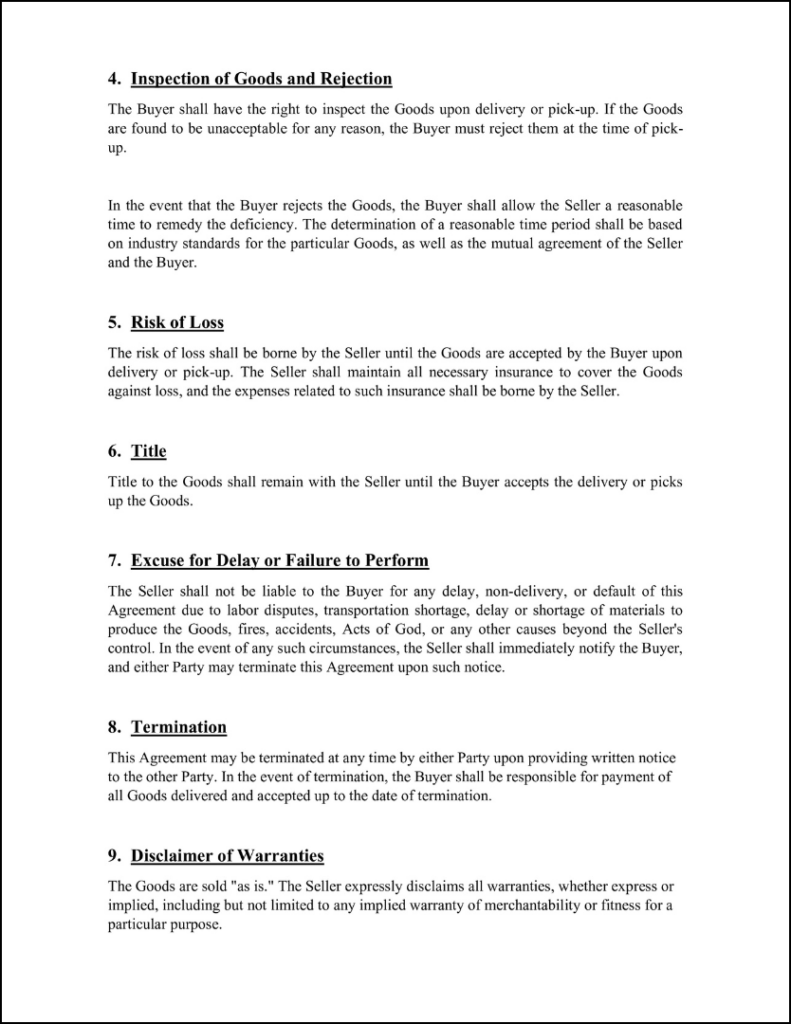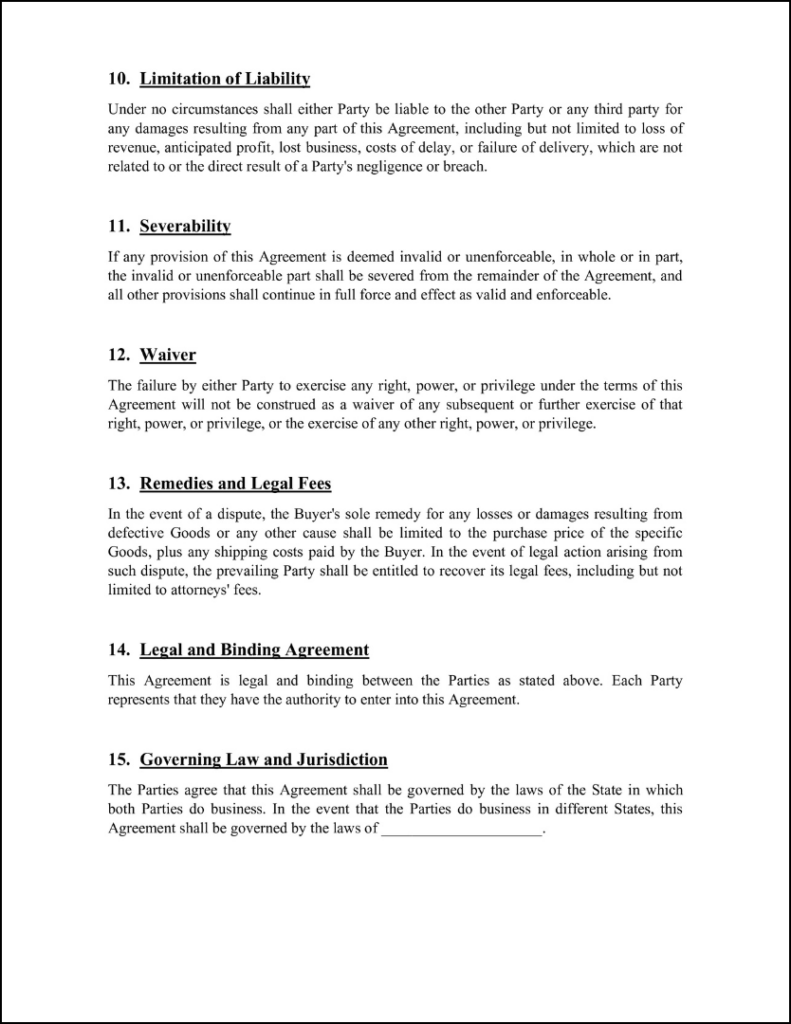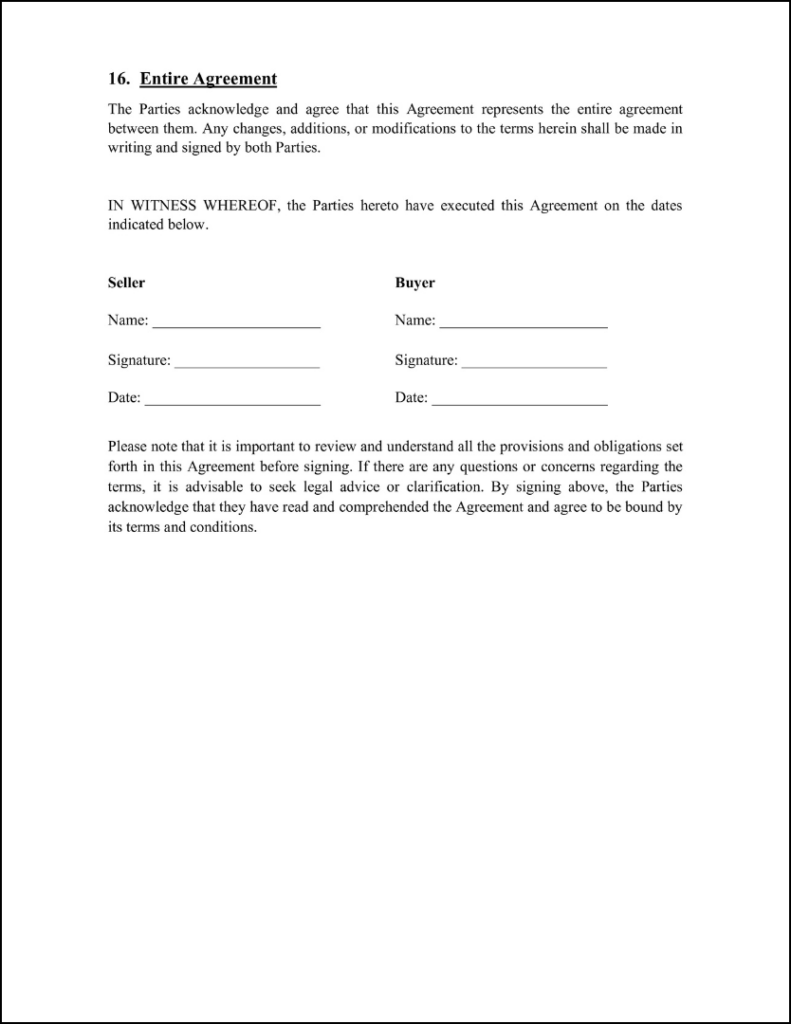
In the dynamic world of business, sales contracts serve as the backbone of successful transactions. It ensures that both parties involved in a sale are protected and have a clear understanding of their rights and obligations. Crafting a sales contract from scratch can be a daunting task, but with the help of a well-designed sales contract template, the process becomes significantly easier and more efficient.
With our sales contract template, you can draft a comprehensive agreement tailored to your specific needs in just a few minutes. Simplify negotiations, clarify responsibilities, and safeguard your interests – all in one document. Download the template now and unlock the potential of your business!



A Sales Contract, also known as a Sales Agreement or Sales Purchase Agreement, is a legally binding document that sets forth the terms and conditions governing a sales transaction between a seller and a buyer. This essential contract outlines the rights, responsibilities, and obligations of both parties, providing a solid framework for a successful business deal. Typically, a Sales Contract covers the following:
Access our free Sales Contract sample to safeguard your interests. Download now and take proactive steps toward a secure Sales Contract at no cost.
A Sales Contract serves as the cornerstone of any business transaction, providing a solid foundation upon which sellers and buyers can build a trustworthy relationship. Let’s delve into the reasons why having a well-crafted sales contract is of utmost importance for your business:
In the fast-paced world of business, ambiguity can lead to disastrous consequences. A Sales Contract ensures clarity by clearly outlining the terms and conditions of the deal. It leaves no room for misinterpretation, enabling both parties to have a crystal-clear understanding of their rights and responsibilities. With such clarity, the risk of misunderstandings and disputes is significantly reduced, fostering a smoother transaction process.
Business dealings can sometimes take an unexpected turn, leading to disputes that may end up in court. A robust sales contract acts as a shield, providing legal protection to all parties involved. In case of disagreements or breaches of the agreement, the contract serves as concrete evidence of the agreed-upon terms, making it easier to resolve conflicts and seek appropriate remedies.
In the competitive business landscape, trust is paramount. A professionally drafted sales contract showcases your commitment to transparency and professionalism. By demonstrating your willingness to engage in a fair and structured agreement, you instill confidence in your customers and partners, solidifying your reputation as a reliable business entity.
Lack of communication or misunderstandings can lead to broken deals and damaged relationships. A well-defined sales contract leaves no room for guesswork. It lays out the expectations of each party clearly and explicitly, ensuring that everyone is on the same page from the outset. This level of communication prevents unnecessary complications and sets the stage for a successful transaction.
A sales contract not only benefits your customers but also protects your own interests as a seller. By outlining specific terms related to payment, delivery, and warranties, you ensure that you receive fair compensation for your products or services. This legal document acts as a safety net, offering you peace of mind and safeguarding your hard-earned assets.
A well-drafted sales contract is a legally enforceable agreement. This means that if one party fails to uphold their end of the bargain, the other party has the legal right to seek remedies or damages through the court system. Having this legal backing reinforces the seriousness of the agreement and compels both parties to fulfill their obligations faithfully.
Creating a comprehensive sales contract is vital to ensuring a smooth and successful business transaction. To help you draft a robust agreement that protects your interests and clarifies responsibilities, consider including the following key elements:
Start the sales contract by clearly stating the offer made by the seller. Include essential details like the product or service being offered, quantity, and any special conditions. The contract should also reflect the buyer’s acceptance of the offer, forming the foundation of the agreement.
Provide a thorough and accurate description of the product or service being sold. Include specifications, models, or any other relevant identifiers to avoid confusion. The more specific the description, the less room there is for misinterpretation.
Clearly outline the agreed-upon price for the product or service, along with the payment method and schedule. Specify whether the payment will be made in installments or in one single sum. Including late payment penalties can encourage prompt payment.
Define the delivery terms, including the delivery location, method, and timeframe. Specify any conditions that need to be met for the completion of the transaction. If the contract involves services, outline the expected performance standards and timelines.
If applicable, provide warranties or guarantees for the product or service. These assurances give the buyer confidence in the quality and reliability of their purchase. Be clear about the duration and extent of the warranties to manage expectations.
Include terms under which any party may cancel the contract. This clause should outline valid reasons for termination and the notice period required. A well-defined termination clause helps avoid confusion and potential disputes.
Define a mechanism for resolving disputes that may arise during the contract’s duration. Mediation, arbitration, or other alternative dispute resolution methods can provide a faster and less costly way to settle disagreements compared to litigation.
If the transaction involves sensitive information or trade secrets, consider including confidentiality and non-disclosure agreements. These clauses protect proprietary information from being shared with third parties.
Specify the governing laws that will apply to the contract and the jurisdiction where legal disputes will be resolved. This helps avoid confusion in cross-border transactions and ensures compliance with local regulations.
Finally, make sure the sales contract includes spaces for both parties’ signatures and the date of signing. Signatures indicate the parties’ agreement and consent to the terms outlined in the contract.
By adhering to these tips, you can create a strong and reliable sales contract that instills confidence in both parties and lays the groundwork for a successful and mutually beneficial business deal. Remember, each transaction is unique, so customize the contract to suit the specific needs and complexities of your business arrangement. With a well-crafted sales contract in place, you can embark on your business ventures with clarity and peace of mind.